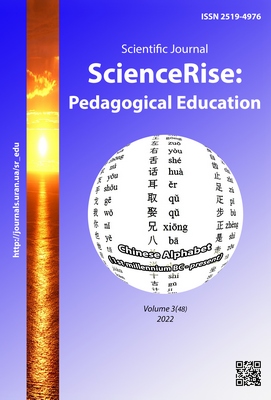Future kindergarten teachers’ pedagogical support in the process of distance learning
DOI:
https://doi.org/10.15587/2519-4984.2022.257858Keywords:
pedagogical support, student, distance learning, educational process, personality, requirements, methodsAbstract
The authors reveal the features of a pedagogical support organization for students of higher educational institutions (on the experience of future kindergarten teacher training) in the process of distance learning. The organization of pedagogical support of the distance learning process is carried out in several scopes, namely: analytical and diagnostic (monitoring of distance learning courses; students’ characteristics studying; identifying their cognitive and professional interests; determining the individual style of cognitive activity; monitoring educational subjects’ interaction); educational (conducting activities that increase distance learning participants’ psychological competence); advisory (advising on the development of learning material, advising distance learning participants on development, learning, professional and personal self-determination, on specific issues that arise during learning) and methodological (creating recommendations for teachers to increase student’s motivation and pedagogical support organization). The authors show that pedagogical support is not only pedagogical activity, aimed at student’s personality self-realization, but also the lecturer’s value attitude to each student’s personality; respect for their individual identities; perception of the student as an equal one, as a subject of the educational process and their lives, who have a unique inner world and ‘Me-concept’; care for future kindergarten teachers’ psychological comfort. Providing students with pedagogical support, the lecturer’s task is to select the types and means of support that would allow the student to unleash their inner potential without imposing a particular way of solving problems
References
- Yan, Ya. (2019). Vyznachennia poniattia «pedahohichna pidtrymka» v ukrainskii ta kytaiskii naukovii literaturi. Teoriia ta metodyka navchannia ta vykhovannia, 47, 211–219.
- Krasnoshchok, I., Kravtsova, T. (2019). Pedahohichnyi suprovid samorealizatsii maibutnikh fakhivtsiv. Ridna shkola, 2, 34–38.
- Malkova, M. O. (2012). Psykholoho-pedahohichna pidtrymka studentiv pershokursnykiv u period adaptatsii u vyshchomu navchalnomu zakladi. Visnyk LNU imeni Tarasa Shevchenka, 22 (257 (VI)), 246–252.
- Lee, J.-Y. (2003). Current status of learner support in distance education: emerging issues and directions for future research. Asia Pacific Education Review, 4 (2), 181–188. doi: http://doi.org/10.1007/bf03025360
- Zazymko, O., Kot, A. (2021). Trudnoshchi studentiv u dystantsiinomu navchanni. Science and practice in the era of globalization. Rotterdam, 39–41.
- Dystantsiina osvita. Vyshcha osvita: informatsiino-analitychnyi portal pro vyshchu osvitu v Ukraini ta za kordonom. Available at: http://vnz.org.ua/dystantsijna-osvita/pro
- Shynkovska, I. L., Zaiets, I. P. (2017). Osoblyvosti dystantsiinoho navchannia v systemi vyshchoi osvity. Naukova dumka suchasnosti i maibutnoho. Available at: http://naukam.triada.in.ua/index.php/konferentsiji/45-p-yatnadtsyata-vseukrajinska-praktichno-piznavalna-internet-konferentsiya/269-osoblivosti-distantsijnogo-navchannya-v-sistemi-vishchoji-osviti
- Karapuzova, I. V. (2015). Organization of Pedagogical Support Technology of Students With Difficulties in Training Activities and Research. Pedahohika formuvannia tvorchoi osobystosti u vyshchii i zahalnoosvitnii shkolakh, 45 (98), 117–123.
- Karapuzova, I. V. (2010). Orhanizatsiia pedahohichnoi pidtrymky maibutnikh uchyteliv u protsesi navchannia. Poltava. Available at: http://dspace.pnpu.edu.ua/handle/123456789/10468
- Kukharenko, V. M., Bondarenko, V. V. (2020). Ekstrene dystantsiine navchannia v Ukraini. Kharkiv: Vyd-vo KP «Miska drukarnia», 409.
Downloads
Published
How to Cite
Issue
Section
License
Copyright (c) 2022 Iryna Karapuzova, Vita Koval

This work is licensed under a Creative Commons Attribution 4.0 International License.
Our journal abides by the Creative Commons CC BY copyright rights and permissions for open access journals.
Authors, who are published in this journal, agree to the following conditions:
1. The authors reserve the right to authorship of the work and pass the first publication right of this work to the journal under the terms of a Creative Commons CC BY, which allows others to freely distribute the published research with the obligatory reference to the authors of the original work and the first publication of the work in this journal.
2. The authors have the right to conclude separate supplement agreements that relate to non-exclusive work distribution in the form in which it has been published by the journal (for example, to upload the work to the online storage of the journal or publish it as part of a monograph), provided that the reference to the first publication of the work in this journal is included.







